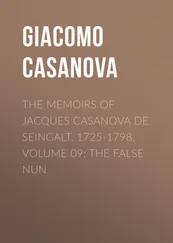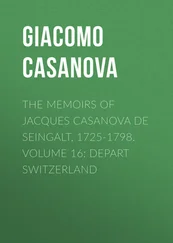Giacomo Casanova - The Memoirs of Jacques Casanova de Seingalt, 1725-1798. Volume 19 - Back Again to Paris
Здесь есть возможность читать онлайн «Giacomo Casanova - The Memoirs of Jacques Casanova de Seingalt, 1725-1798. Volume 19 - Back Again to Paris» — ознакомительный отрывок электронной книги совершенно бесплатно, а после прочтения отрывка купить полную версию. В некоторых случаях можно слушать аудио, скачать через торрент в формате fb2 и присутствует краткое содержание. Жанр: Биографии и Мемуары, История, foreign_edu, foreign_antique, foreign_prose, на английском языке. Описание произведения, (предисловие) а так же отзывы посетителей доступны на портале библиотеки ЛибКат.
- Название:The Memoirs of Jacques Casanova de Seingalt, 1725-1798. Volume 19: Back Again to Paris
- Автор:
- Жанр:
- Год:неизвестен
- ISBN:нет данных
- Рейтинг книги:5 / 5. Голосов: 1
-
Избранное:Добавить в избранное
- Отзывы:
-
Ваша оценка:
- 100
- 1
- 2
- 3
- 4
- 5
The Memoirs of Jacques Casanova de Seingalt, 1725-1798. Volume 19: Back Again to Paris: краткое содержание, описание и аннотация
Предлагаем к чтению аннотацию, описание, краткое содержание или предисловие (зависит от того, что написал сам автор книги «The Memoirs of Jacques Casanova de Seingalt, 1725-1798. Volume 19: Back Again to Paris»). Если вы не нашли необходимую информацию о книге — напишите в комментариях, мы постараемся отыскать её.
The Memoirs of Jacques Casanova de Seingalt, 1725-1798. Volume 19: Back Again to Paris — читать онлайн ознакомительный отрывок
Ниже представлен текст книги, разбитый по страницам. Система сохранения места последней прочитанной страницы, позволяет с удобством читать онлайн бесплатно книгу «The Memoirs of Jacques Casanova de Seingalt, 1725-1798. Volume 19: Back Again to Paris», без необходимости каждый раз заново искать на чём Вы остановились. Поставьте закладку, и сможете в любой момент перейти на страницу, на которой закончили чтение.
Интервал:
Закладка:
"Oh, yes! I understand. Your mother is at Prague, and as she doesn't get her pension on account of the war, I am afraid she must be rather in difficulties."
"I know it, but I do not forget my filial duties. I have sent her some money."
"That's right. Where are you going to stay at Augsburg?"
"I shall take a house, and if you like you shall be the mistress and do the honours."
"That would be delightful! We will give little suppers, and play cards all night."
"Your programme is an excellent one."
"I will see that you get a good cook; all the Bavarian cooks are good. We shall cut a fine figure, and people will say we love each other madly."
"You must know, dearest, that I do not understand jokes at the expense of fidelity."
"You may trust me for that. You know how I lived at Dresden."
"I will trust you, but not blindly, I promise you. And now let us address each other in the same way; you must call me tu. You must remember we are lovers."
"Kiss me!"
The fair Renaud did not like traveling by night; she preferred to eat a good supper, to drink heavily, and to go to bed just as her head began to whirl. The heat of the wine made her into a Bacchante, hard to appease; but when I could do no more I told her to leave me alone, and she had to obey.
When we reached Augsburg we alighted at the "Three Moors," but the landlord told us that though he could give us a good dinner he could not put us up, as the whole of the hotel had been engaged by the French ambassador. I called on M. Corti, the banker to whom I was accredited, and he soon got me a furnished house with a garden, which I took for six months. The Renaud liked it immensely.
No one had yet arrived at Augsburg. The Renaud contrived to make me feel that I should be lonely at Augsburg without her, and succeeded in persuading me to come with her to Munich. We put up at the "Stag," and made ourselves very comfortable, while Desarmoises went to stay somewhere else. As my business and that of my new mate had nothing in common, I gave her a servant and a carriage to herself, and made myself the same allowance.
The Abbe Gama had given me a letter from the Commendatore Almada for Lord Stormont, the English ambassador at the Court of Bavaria. This nobleman being then at Munich I hastened to deliver the letter. He received me very well, and promised to do all he could as soon as he had time, as Lord Halifax had told him all about it. On leaving his Britannic Lordship's I called on M. de Folard, the French ambassador, and gave him a letter from M. de Choiseul. M. de Folard gave me a hearty welcome, and asked me to dine with him the next day, and the day after introduced me to the Elector.
During the four fatal weeks I spent at Munich, the ambassador's house was the only one I frequented. I call these weeks fatal, and with reason, for in then I lost all my money, I pledged jewels (which I never recovered) to the amount of forty thousand francs, and finally I lost my health. My assassins were the Renaud and Desarmoises, who owed me so much and paid me so badly.
The third day after my arrival I had to call on the Dowager Electress of Saxony. It was my brother-in-law, who was in her train, that made me go, by telling me that it must be done, as she knew me and had been enquiring for me. I had no reason to repent of my politeness in going, as the Electress gave me a good reception, and made me talk to any extent. She was extremely curious, like most people who have no employment, and have not sufficient intelligence to amuse themselves.
I have done a good many foolish things in the course of my existence. I confess it as frankly as Rousseau, and my Memoirs are not so egotistic as those of that unfortunate genius; but I never committed such an act of folly as I did when I went to Munich, where I had nothing to do. But it was a crisis in my life. My evil genius had made me commit one folly after another since I left Turin. The evening at Lord Lismore's, my connection with Desarmoises, my party at Choisi, my trust in Costa, my union with the Renaud, and worse than all, my folly in letting myself play at faro at a place where the knavery of the gamesters is renowned all over Europe, followed one another in fatal succession. Among the players was the famous, or rather infamous, Affisio, the friend of the Duc de Deux-Ponts, whom the duke called his aide-decamp, and who was known for the keenest rogue in the world.
I played every day, and as I often lost money on my word of honour, the necessity of paying the next day often caused me the utmost anxiety. When I had exhausted my credit with the bankers, I had recourse to the Jews who require pledges, and in this Desarmoises and the Renaud were my agents, the latter of whom ended by making herself mistress of all my property. This was not the worst thing she did to me; for she, gave me a disease, which devoured her interior parts and left no marks outwardly, and was thus all the more dangerous, as the freshness of her complexion seemed to indicate the most perfect health. In short, this serpent, who must have come from hell to destroy me, had acquired such a mastery over me that she persuaded me that she would be dishonoured if I called in a doctor during our stay at Munich, as everybody knew that we were living together as man and wife.
I cannot imagine what had become of my wits to let myself be so beguiled, while every day I renewed the poison that she had poured into my veins.
My stay at Munich was a kind of curse; throughout that dreadful month I seemed to have a foretaste of the pains of the damned. The Renaud loved gaming, and Desarmoises was her partner. I took care not to play with them, for the false marquis was an unmitigated cheat and often tricked with less skill than impudence. He asked disreputable people to my house and treated them at my expense; every evening scenes of a disgraceful character took place.
The Dowager Electress mortified me extremely by the way she addressed me on my last two visits to her.
"Everybody knows what kind of a life you lead here, and the way the Renaud behaves, possibly without your knowing it. I advise you to have done with her, as your character is suffering."
She did not know what a thraldom I was under. I had left Paris for a month, and I had neither heard of Madame d'Urfe nor of Costa. I could not guess the reason, but I began to suspect my Italian's fidelity. I also feared lest my good Madame d'Urfe might be dead or have come to her senses, which would have come to the same thing so far as I was concerned; and I could not possibly return to Paris to obtain the information which was so necessary both for calming my mind and refilling my purse.
I was in a terrible state, and my sharpest pang was that I began to experience a certain abatement of my vigors, the natural result of advancing years. I had no longer that daring born of youth and the knowledge of one's strength, and I was not yet old enough to have learnt how to husband my forces. Nevertheless, I made an effort and took a sudden leave of my mistress, telling her I would await her at Augsburg. She did not try to detain me, but promised to rejoin me as soon as possible; she was engaged in selling her jewellery. I set out preceded by Le Duc, feeling very glad that Desarmoises had chosen to stay with the wretched woman to whom he had introduced me. When I reached my pretty house at Augsburg I took to my bed, determined not to rise till I was cured or dead. M. Carli, my banker, recommended to me a doctor named Cephalides, a pupil of the famous Fayet, who had cured me of a similar complaint several years before. This Cephalides was considered the best doctor in Augsburg. He examined me and declared he could cure me by sudorifics without having recourse to the knife. He began his treatment by putting me on a severe regimen, ordering baths, and applying mercury locally. I endured this treatment for six weeks, at the end of which time I found myself worse than at the beginning. I had become terribly thin, and I had two enormous inguinal tumours. I had to make up my mind to have them lanced, but though the operation nearly killed me it did not to make me any better. He was so clumsy as to cut the artery, causing great loss of blood which was arrested with difficulty, and would have proved fatal if it had not been for the care of M. Algardi, a Bolognese doctor in the service of the Prince-Bishop of Augsburg.
Читать дальшеИнтервал:
Закладка:
Похожие книги на «The Memoirs of Jacques Casanova de Seingalt, 1725-1798. Volume 19: Back Again to Paris»
Представляем Вашему вниманию похожие книги на «The Memoirs of Jacques Casanova de Seingalt, 1725-1798. Volume 19: Back Again to Paris» списком для выбора. Мы отобрали схожую по названию и смыслу литературу в надежде предоставить читателям больше вариантов отыскать новые, интересные, ещё непрочитанные произведения.
Обсуждение, отзывы о книге «The Memoirs of Jacques Casanova de Seingalt, 1725-1798. Volume 19: Back Again to Paris» и просто собственные мнения читателей. Оставьте ваши комментарии, напишите, что Вы думаете о произведении, его смысле или главных героях. Укажите что конкретно понравилось, а что нет, и почему Вы так считаете.












